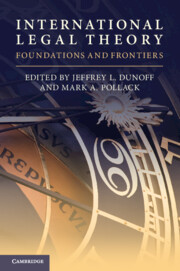Book contents
- International Legal Theory
- Reviews
- International Legal Theory
- Copyright page
- Contents
- Contributors
- Acknowledgments
- Part I Introduction: Setting the Stage
- Part II Traditional Approaches to International Law
- Part III Critical Approaches to International Law
- Part IV Post–Cold War Approaches to International Law
- Part V Interdisciplinary Approaches to International Law
- 12 Rationalist and Behavioralist Approaches to International Law
- 13 The Sociological Perspective on International Law
- 14 The Practice of Interpretation in International Law: Strategies of Critique
- Part VI International Law: Dialogue and Dialectic
- Index
14 - The Practice of Interpretation in International Law: Strategies of Critique
from Part V - Interdisciplinary Approaches to International Law
Published online by Cambridge University Press: 21 July 2022
- International Legal Theory
- Reviews
- International Legal Theory
- Copyright page
- Contents
- Contributors
- Acknowledgments
- Part I Introduction: Setting the Stage
- Part II Traditional Approaches to International Law
- Part III Critical Approaches to International Law
- Part IV Post–Cold War Approaches to International Law
- Part V Interdisciplinary Approaches to International Law
- 12 Rationalist and Behavioralist Approaches to International Law
- 13 The Sociological Perspective on International Law
- 14 The Practice of Interpretation in International Law: Strategies of Critique
- Part VI International Law: Dialogue and Dialectic
- Index
Summary
The practice of interpretation brings the law to life. It takes part in shaping and making the law, and does not just give effect to the law that is out there. To the extent that international law affects peoples’ everyday life, so does the practice of interpretation. Even more so than other fields of law, international law is in large parts the product of interpretative practice. What then is this practice of interpretation?
Interpretation is best understood as an argument about what the law means. While such an understanding of interpretation enjoys considerable common ground, it immediately begs the question of how to then understand that practice of arguing. I will distinguish four different approaches to that question in light of their strategy of critique – whether that critique is formalist, instrumentalist, realist, or immanent. In other words, what are the arguments and broader strategies with which to criticize a specific interpretation or a broader interpretative practice? This question will provide the pathway for approaching the practice of interpretation.
- Type
- Chapter
- Information
- International Legal TheoryFoundations and Frontiers, pp. 305 - 324Publisher: Cambridge University PressPrint publication year: 2022

